Question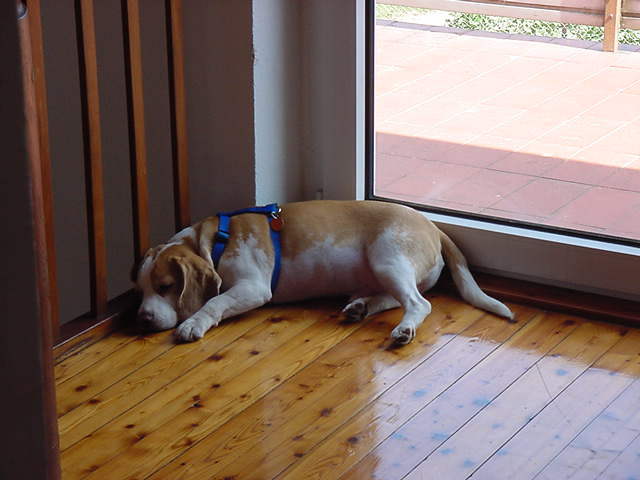 Georgie
Georgie
QUESTION: Hi,
I have a 7 year old beagle. We adopted him at 1 1/2 years old....we are his 4th owner. He came with many problems; aggressive towards food, stealing everything, not house broken. I loved him anyway. We have conquered most of the above to our satisfaction. For the last 4 years, he has been obsessed with licking the carpet and any other fabric he is on. He will not stop. I realize this is not a destructive thing I just want to try to understand why he does it and if there is anything I can do about it. One vet has talked about OCD and putting him on Buspar or some kind of anti-anxiety pills...but I am just not sure if that is good for him. I did have a dog 7 years ago with Anxiety Separation that cause very destructive behavior. At 12 years old a German doctor had me put her on Buspar and she had the best 3 years of life after that. She did have a stroke and I had to put her down.....so I am afraid that might have caused it. I am grateful for your advise.
Christine
ANSWER: It does appear that Buspirone (brand name Buspar) has been attributed to stroke in humans, but having not seen the actual studies I can't speak in regard to what other factors were involved (age of patient, lifestyle, inherited factors, etc.) However, Buspirone (Buspar) is prescribed for generalized anxiety and not separation anxiety or OCD behaviors. Clomipramine (clomicalm) is presently being prescribed for OCD and separation issues in dogs. Whether or not your dog should be taking any medication is dependent on his overall health. From the photograph (cute dog!) it appears that your Beagle is substantially overweight. This is not in any way contributory to his OCD (if that is, in fact, what he suffers from) but this dog needs to be more carefully monitored for calorie intake and an exercise routine (introduced slowly) would certainly help his longevity. (PS: check the harness, it appears tight in this picture and might be uncomfortable.)
The behavior you describe might be an artifact of his distant past (a self calming routine) or an acquired behavior from having learned something tasted "good" at one time on a garment or other fabric. This behavior can be corrected but it requires you to be quite vigilant. Whenever you see him licking a fabric of any sort, say "Stop licking" in a sharp, but not loud, manner. If he ignores you, clap your hands and repeat the phrase. Once he has stopped, immediately engage him in a short, trained behavior you can reward. It may take quite a while (months) for him to REDUCE this behavior (but it won't totally extinguish) but this will work to at least somewhat minimize it. If this behavior is not harmful (he's not ingesting fabric, just licking it) or destructive (holes in rugs), and it's the only behavior you are seeing that may indicate anxiety, I'd attempt to minimize it using behavior modification, rather than medication. You might also want to consult a veterinary neurologist to see if the dog is suffering from some low level seizure disorder.
---------- FOLLOW-UP ----------
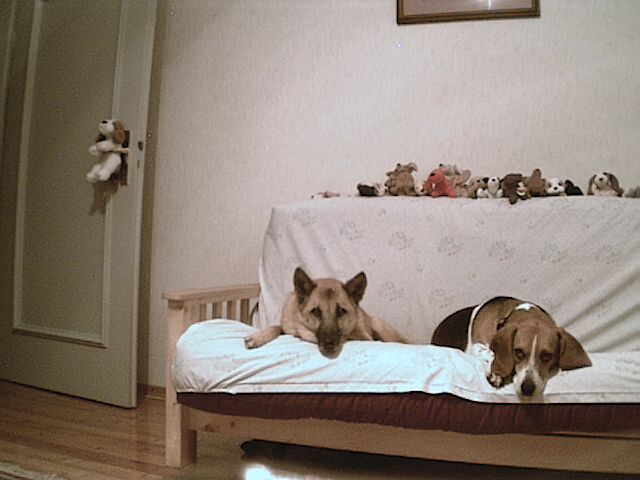 Kiwi and Anniemae
Kiwi and Anniemae
QUESTION: Good Day and thank you for your insightful response. I must say I almost cryed to know that I may have caused my dogs stroke by putting her on the meds. She was 15 when she was put down but she was the greatest dog in the world as long as you did not leave her alone....I would not even concider putting any of my animals on meds like that again....Thank you for that info. Back to Georgie...The picture of him was from when we first got him. He was only 18 lbs in the picture-full grown 13 inch beagle...he was a very strong stockie dog. He is overwieght now unfortunetly. He gets 3/4 cup of food 2x a day and very few if any treats-carrots if he does get them. He know longer wears the halter and really only wore it because his kneck was raw from the collar he came with. Once that healed, we worked on his training etc with a prong collar and that works fantastic....no pulling:) I will try to increase his activity....everytime that we start anything with him, he limps for days.....He has just yesterday slipped on the small spot of floor that has no carpet and twisted his leg, can walk without a limp but is slow and crys if it gets tangled in his blanket. He is a dufus and not the smarted dog, but I love him and am a lifetime pet owner, regardless of the problems. I will try your advise and start with just a block at a time and see if we can get his weight down....He has his blood checked yearly for thyroid issues as my other beagle has problems but Georgie is good in all counts but one....I dont have his records here at home but I was told that he has some kind of joint disorder that makes if difficult to jump up on the couch or bed....and long hikes are very painful. We just moved and have not found a new vet that I trust....but will continue to look and have them look into some other options as well.
thank you again
Christine
AnswerGET RID OF THAT PRONGED COLLAR! IT'S BARBARIC! You do not teach a dog anything by inflicting pain; if the prongs hurt the dog (AND THEY DO) when he pulls forward, he may very well associate the object he is pulling forward TO as the culprit for the pain. I know you are very well intentioned and a kind and loving owner. Throw that collar into the garbage where it belongs. Use a Halti instead; this is a head collar that is used along with the buckle around and should have its own leash. Change direction (quickly but carefully) whenever the dog pulls you forward; associate a word or phrase (like "come along") with the change of direction; after the dog has changed direction, walk in a circle and reward him (with praise and a NON FAT treat lol) for following you. He will soon learn the phrase "come along" means he must change his behavior (pulling forward) for reward and praise.
Do NOT fault yourself for the medication you used on your former dog; there isn't substantial evidence that it caused the dog's stroke (and how do you know it was a stroke? Without extensive necropsy no one can tell). Sometimes medication helps dogs; it appears that, whatever the cause of the distress your deceased dog was experiencing (and it may very well have been neurological and associated with the cause of death), the medication helped her to enjoy the last years of her life. GUILT DOES NO ONE ANY GOOD. Without INTENTION TO HARM (and I know you had NONE of that!), there need be NO GUILT. You are a kind, loving and caring person and your dogs are fortunate to be in your home.



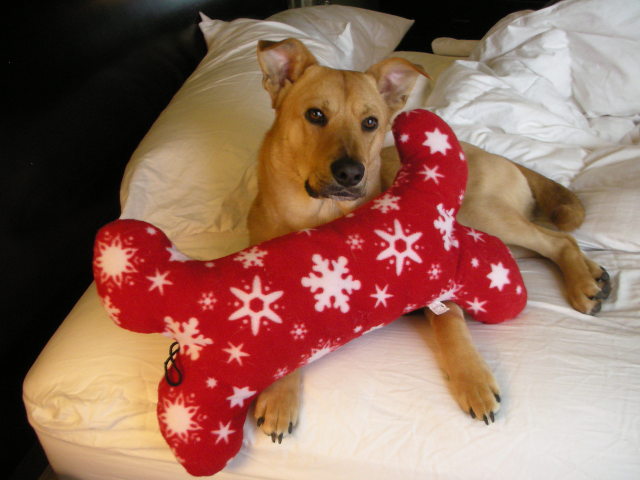 Very Scared Dog
Question
Happy
My dog is 17 months old and is a mixed b
Very Scared Dog
Question
Happy
My dog is 17 months old and is a mixed b
 licking the floor not stop
QuestionGeorgie
QUESTION: Hi,
I have a 7 year ol
licking the floor not stop
QuestionGeorgie
QUESTION: Hi,
I have a 7 year ol
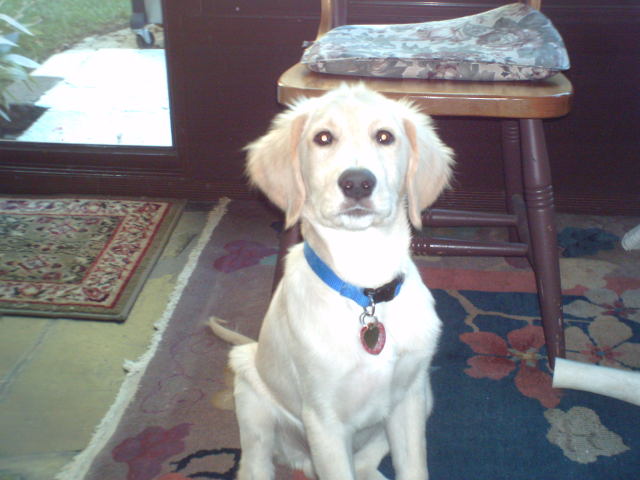 my 7 month old golden changed for the worse
QuestionRiley at 6 months
QUESTION: I got a gold
my 7 month old golden changed for the worse
QuestionRiley at 6 months
QUESTION: I got a gold
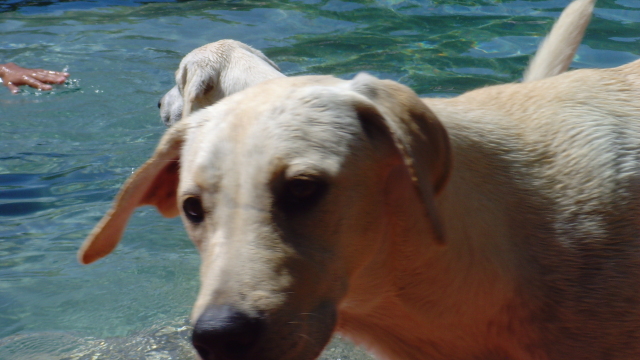 Psychological trauma
Question
Izzy
I recently took my 1 year old dog to a fr
Psychological trauma
Question
Izzy
I recently took my 1 year old dog to a fr
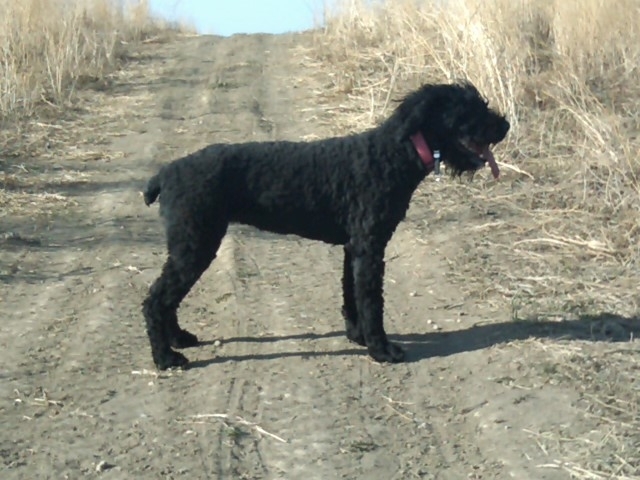 I was riding my bicycle when my 1yr old Bouvier bit my leg
Question
Pup
Hello, I have a 1yr old intact Bouvier bit
I was riding my bicycle when my 1yr old Bouvier bit my leg
Question
Pup
Hello, I have a 1yr old intact Bouvier bit